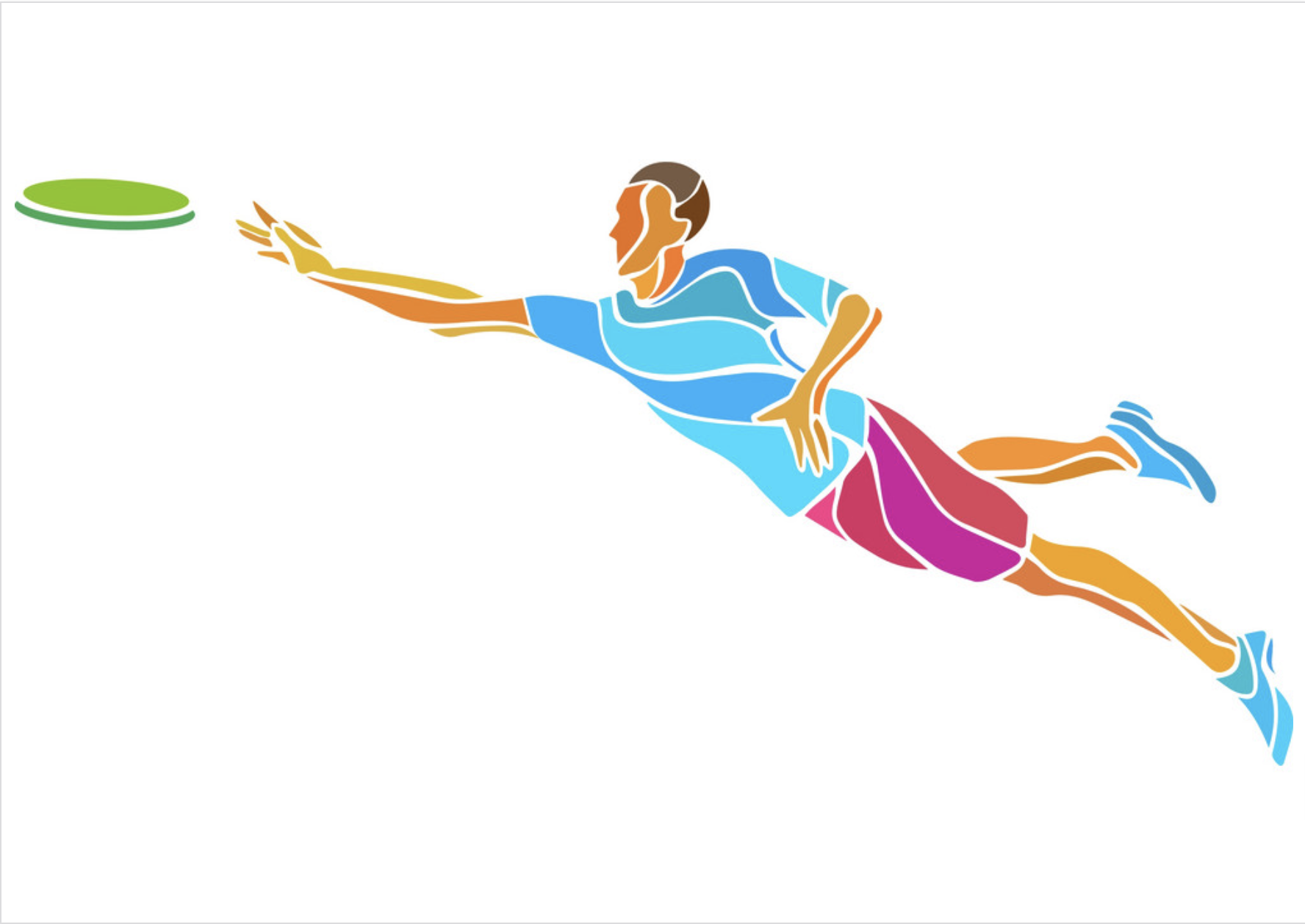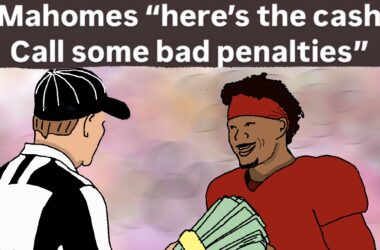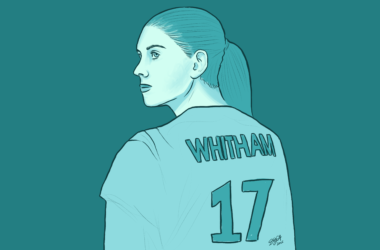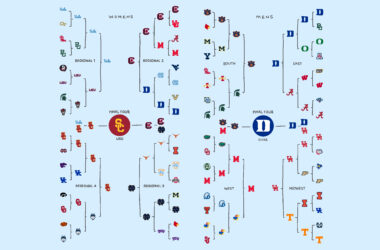We’ve all spent a warm summer day lazily throwing a frisbee around with our friends. But if one were to go to Parc Jeanne-Mance on a sunny Sunday afternoon, they would find a group of adults throwing a disc in ways you would not think were possible. With full uniforms, cleats, and players barking directions at each other, this looks more like a game of football or basketball than the friendly, carefree context that usually accompanies the graceful toss of a frisbee. This is ultimate, and it’s been growing, quietly, since its founding in 1968.
The first ultimate team was forged in a high school parking lot in the heart of suburban New Jersey by high schooler Joel Silver, later known for producing The Matrix. The teams were separated into student government versus school-newspaper kids and were first coached by a janitor who had some spare time. Silver had invented a new sport with soaring discs, endless possibilities for creative growth, and most importantly, ‘spirit of the game’: A loose concept that emphasizes the burden of sportsmanship and the responsibility of governance on the player. Thus, ultimate is the only sport that operates without referees at every level. The “win first” mentality that is so heavily encouraged in other sports is regarded with disdain in ultimate.
Ultimate has grown from a borderline joke in a parking lot into a professional sport with paid contracts and touring teams. Its development can be attributed to growth throughout the ‘70s and ‘80s, with the initial founders bringing ultimate to their colleges and laying the foundation for what would evolve into a competitive international sport.
Today, ultimate has grown to the professional level, but those who play know that the real basis for the sport lies in the intense, tight-knit club and intramural scene that exists in almost every major urban area in North America. Every week, communities of eccentric and competitive players of all backgrounds, ages, and skill levels gather for a few hours of unadulterated, exhilarating fun.
Everybody has a different story for how they got involved in ultimate. Gwany Patenaude had been a lifelong athlete when she picked up ultimate as her primary sport in secondary school. Previously, she was a swimmer, but found herself without a sport, and so she decided to reestablish her CEGEP ultimate team.
“I thought the combination of the team aspect of the sport [and] how much you could improve individually is what really drew me in,” Patenaude said in an interview with The McGill Tribune.
Within three months, she joined Team Quebec and, later, Team Montreal as well. As a CEGEP student, she balances playing on two high-level teams, on top of coaching the McGill Men’s B ultimate team.
For Kevin Quinlan, a professional player for the Montreal Royal, ultimate started as a more casual activity.
“It started more […] like a social event than [as] a competitive thing for us,” Quinlan said in an interview with the Tribune. “We were just hanging out. Frisbee was just complementing the goofy people we were. It was when I got to college that I realized that this was more of a competitive sport, and […] people take it really seriously.”
For those who play it, ultimate is a lot more than a sport; everybody has their own reasons for loving the game.
“At first, it was really just a way to hang out with […] a really cool group of people,” Quinlan said. “But then it became the creativity you can use within the sport. There’s a lot of different ways to win. You’re always learning [and] adapting to different situations. That’s what I really love about the game.”
For Patenaude, it is the sense of community that lies at the core of the game that she believes makes ultimate so appealing.
“When you’re playing the game, it doesn’t matter [if you are] advanced or [a] beginner, you are all together,” Patenaud said. “I started out as a beginner, surrounded by people on national teams, and felt accepted.”
The level of acceptance and fair style of play speaks to the sense of community that runs deep and is integral to the sport itself. The “spirit of the game” concept has been ingrained in ultimate since its founding in 1968 and is still taken very seriously. The American Ultimate Disc League (AUDL) maintains the player-officiated structure of the game, only recently implementing the use of “observers” who help mediate disagreements between teams. On the more local pick-up scene, the ‘spirit of the game’ translates to more than just sportsmanship and a self-officiated game: Players take pride in creating a competitive yet accepting and fun environment that prioritizes a sense of inclusivity and fun, which is lacking in most other competitive sports.
“I’ve very rarely seen anyone intentionally try to abuse the rules or be unsportsmanlike,” second-year computer science student Adrien Philardeau-Planche of the McGill Men’s B team said. “There is always a high level of respect between opponents, and games essentially always remain fair, even though there are no referees in the sport. People play hard, but they don’t play dirty [….] The same can be said about Montreal’s Frisbee community. It’s very Québécois, very friendly, and quite competitive. It’s a lot of fun.”
In Montreal, ultimate flourishes every week through rain, sleet, and snow. Montrealers meet up in self- or club-organized groups to compete and have fun. Ultimate Grand Montreal, a volunteer based group, has been facilitating the growth of the community since 1993 with a mission of “encouraging the practice and development of recreational and competitive ultimate in the Montreal metropolitan area, by promoting and upholding the Spirit of the Game.” Today, UGM organizes dozens of leagues all throughout Montreal in addition to facilitating outreach programs to teach children, encourage development, and reinforce the values of hard work and the spirit of the game.
Ultimate also exists in open pickup groups, a more casual and less organized form of the game. Every week, groups of university students, tourists, Mile-End tech professionals, and even middle-aged doctors talk on Facebook and schedule meeting times. People from across the city toss their bikes and work bags into a haphazard pile on the side of a field, and don light or dark shirt in accordance with a loosely adhered-to lights and darks policy. Then the frisbee takes flight and everything else is left behind.
“What’s unique about Montreal is that there [are] so many ways to get involved in ultimate, and to learn ultimate, and that’s really what’s unique about the city,” Quinlan said. “In smaller towns, it’s really hard to find that community. [Here,] you can start and work your way up from any level.”
Ultimate’s popularity is growing in Montreal, with kids, for the first time, picking it up at a young age. Pathenaude, who co-captains the McGill Men’s B Team, was especially surprised by her experience coaching youth outreach ultimate programs.
“I had never met so many kids who were only playing ultimate […] as their primary sport,” Pathenaud said. “They were nailing throws I didn’t learn until I was 17.”
Kids picking up the sport at younger and younger ages speaks wonders for the growth of ultimate in future years. The graceful, floating nature of the disc, the intricate strategic positioning and cuts, and the free flowing nature of the game, along with the endless possibilities for creativity, truly make for the ultimate sport.









